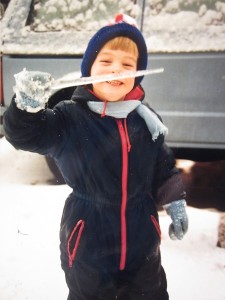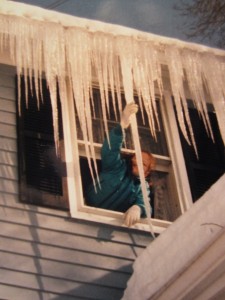 Nobody can holler like a newborn. They make an abrasive noise-pollution sort of sound much like a crow cawing or a cat in fight-mode. Pegging it perfectly is difficult, but new babies all seem to agree on how it should sound.
Nobody can holler like a newborn. They make an abrasive noise-pollution sort of sound much like a crow cawing or a cat in fight-mode. Pegging it perfectly is difficult, but new babies all seem to agree on how it should sound.
Parents agree on something, too: that it should stop a.s.a.p.
Baby Isaac celebrates his one week birthday tomorrow, and like all babies, he has his moments of wailing. Diaper changes are his least favorite activity, during which he voices his opinion at full volume. When that happens, even grandmas are distressed by the crying.
It’s not that the noise level is intolerable. Isaac’s three older siblings contribute plenty of that, but it never reaches the fever-pitch of a newborn’s cry. When Isaac is wailing, we wonder if he’s in some serious pain or is in another kind of desperate need.
But we have to continually remind ourselves that newborns don’t have much to offer between silence and full-on screaming. They haven’t learned anything about that middle ground, whining, and certainly can’t use words. Hard-core hollering is the best they can do, and it’s usually overkill in comparison to their needs, i.e. major outbursts over minor problems.
Sometimes I wonder if God views our flare-ups against him the same way. Of course we don’t see it as “screaming” directly at him and might even say, “Heaven forbid I should do such a thing!” But when we loudly object to the circumstances he puts us in (or allows us to be in), he’s probably thinking, “Major outbursts over minor problems.”
Although baby Isaac has nature on his side when he’s hollering over every need, we don’t. As adults, especially Christian adults, we ought to know better than to rail against situations just because they’re not ideal. When frustrations and annoyances come, God is hoping we’ll resist the temptation to object and will square off with our needs responsibly, improving what we can, and accepting what we can’t.
It’s good to know, though, that God doesn’t put a complete ban on crying. He knows we’re emotional beings that need to show our feelings. If we look to Scripture for guidance, we see all kinds of godly people in tears: widows, mothers, fathers, oppressed people, Jeremiah, Job, Mary, Hezekiah, Peter, Esau, David, Paul, and Jesus himself, to name a few. The difference between weeping that’s welcomed by God and wailing that’s not, is the condition of the heart behind it.
 God’s heart is always tuned in to what’s going on in the hearts of people… all people. Nothing slips past him, and everything matters. That’s why a bout of crying that emanates from a sincere, unselfish heart is a call for help he will always answer.
God’s heart is always tuned in to what’s going on in the hearts of people… all people. Nothing slips past him, and everything matters. That’s why a bout of crying that emanates from a sincere, unselfish heart is a call for help he will always answer.
As for little Isaac, he’s still under the lovely protection of God’s Grace for Newborns and can wail all he wants.
“During the days of Jesus’ life on earth, he offered up prayers and petitions with fervent cries and tears.” (Hebrews 5:7)








